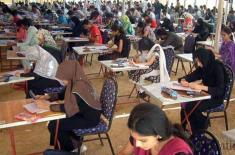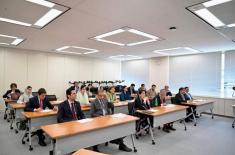
RPT: ANALYSIS - Withdrawal Of Russia, US To Render Open Skies Treaty Pointless
Muhammad Irfan Published June 06, 2021 | 11:10 AM

WASHINGTON (UrduPoint News / Sputnik - 06th June, 2021) The dual withdrawal of the United States and Russia from the Open Skies Treaty (OST) would leave the pact lacking a rationale for existence and hardly capable of fulfilling its Primary function despite memberships of over 30 other countries remaining in effect, experts told Sputnik.
The US left the OST last November. Russia began the 6-month withdrawal procedure in January. This Wednesday, the Russian upper house unanimously passed a bill to denounce the OST, which was signed back in 1992 as one of the key confidence-building tools after the Cold War.
The US Department of State has recently said that Washington will not rejoin the treaty, citing concerns over Russian non-compliance with the accord as the reason for the withdrawal. Russia reacted to the statement by saying that it was disappointed and adding that the move does not contribute to a favorable atmosphere for discussing arms control at the upcoming meeting between Russian President Vladimir Putin and US President Joe Biden on June16.
With 35 signatories at its peak, the treaty, was commonly believed to be a tool for deescalating tensions and building trust between Russia and the collective West, primarily the United States and other NATO members, by committing each to let other parties conduct unarmed surveillance flights over their territory to monitor military activities.
CEASE TO SERVE PRIMARY FUNCTION
Without the US and Russia among members, the treaty will "cease to serve its primary function," Noah Mayhew, a research associate at the Vienna Center for Disarmament and Non-Proliferation, told Sputnik.
"The treaty was meant to provide confidence between the US, Russian and European participants that no untoward military (or other) activities were in preparation. The primary focus of this confidence- and the transparency-building measure was US and Russian activities. Without the US or Russia in the treaty, its utility is drastically reduced," he said.
Allowing this treaty to suffer the same fate as the Intermediate-Range Nuclear Forces Treaty (INF) is both "short-sighted and irresponsible," Mayhew noted. He pointed out, however, that, unlike the INF, Open Skies has more than two participants and, therefore, "is not necessarily in danger of fading out of existence.
"
"In this regard, there may be an opportunity for the US and Russia to rejoin the Open Skies Treaty under less politically tense conditions. In the meantime, parties to Open Skies may consider ways to modernize the treaty," he suggested.
Nikolai Sokov, a senior fellow at the Vienna Center for Disarmament and Nonproliferation, also rose concerns about the effectiveness of the deal without the two key powers.
"The treaty can continue after the US and the Russian withdrawals ... but it will lose the main rationale for its existence," he told Sputnik.
According to Sokov, the other participants will likely discuss whether to keep or discard the treaty at the next review conference.
"The only reason to keep it would be, really, just to make a political point; there will be few reasons for Western countries to fly OST missions except over Belarus; Belarus may be more interested as its flights would be in the interests of Russia (and to prevent Russia from obtaining data from Belarusian flights, Europeans countries may wish to terminate the treaty)," he said.
Sokov admitted that he cannot imagine another US-Russian treaty with similar functions.
"OST was fully adequate as it was. There is a low probability that if OST remains in force then at some point in the future the US and Russia may rejoin, but this is a very, very low probability. It seems we've lost OST forever," he said.
Mayhew also does not believe that the US and Russia may reach an entirely new agreement "in the near term." He said that he joins many experts calling on the two powers to start serious talks at the working level now on a follow-on treaty to New START.
"However, it may be more feasible in the near term to focus on supporting existing initiatives and establishing informal confidence- and transparency-building measures that lay the groundwork for legally binding, verifiable agreements. In this regard, it is imperative to reinvigorate laboratory-to-laboratory cooperation on nuclear verification between the US and Russia so that, once political will exists to conclude an agreement, the parties can move quickly to establish the verification regime," he said.
Related Topics
Recent Stories

Minister praises Al-Makki Al-Madni Dialysis Centre in Lahore’s Tajpur over ser ..

Officers of the 38th Senior Management Course called on Dr Musadik Malik

FGP CEO expresses grief over loss of lives, homes in flood-hit areas

The schedule for the PMS Phase-II examinations has been officially issued by the ..

CM Maryam Nawaz Visits Japan, Punjab Police will be given special infrared and u ..

Saudi Arabia launches new 'Nusuk Umrah' service to streamline visas, travel for ..

UN Chief: Give Africa greater say!

Chairman FTT urges to safeguard tobacco farmers

PTI founder availing facilities in jail: Rana Sanaullah

Mangla police busted motorcycle lifters gang, drug peddlers

Following President's directives, UAE conducts urgent medical evacuation for pat ..

Using internal, external resources to help address challenges of climate change: ..
More Stories From World
-

King of UK sends condolence message to Pakistan amidst monsoon flooding
2 hours ago -

China shares waste paper recycling solutions with Belt and Road partners
2 hours ago -

Pakistani MPs call on Nepal Speaker of House of Representative
6 hours ago -

At least 76 died in Afghanistan's Herat road accident
8 hours ago -
China-Pakistan cooperation scores 12 deals worth 235 million yuan in Kashgar
11 hours ago -
Beijing Solution Expo will be unveiled at the 2025 CIFTIS
11 hours ago
-
At UN, Pakistan debunks India's allegations of human rights abuses as 'fallacious'
14 hours ago -
Pakistan calls for ending women's suffering, abuse in occupied Kashmir & Palestine
17 hours ago -

China-Pakistan cooperation scores 12 deals worth 235 million yuan in Kashgar
1 day ago -

Aid into Gaza insufficient to avert ‘widespread starvation’ as Israeli restrictions continue: UN
1 day ago -

Egyptian TikToker ‘Yasmin’ revealed to be 18-year-old male student
1 day ago -
Parliamentarians HKH region emphasize to work together for climate resilience
1 day ago






